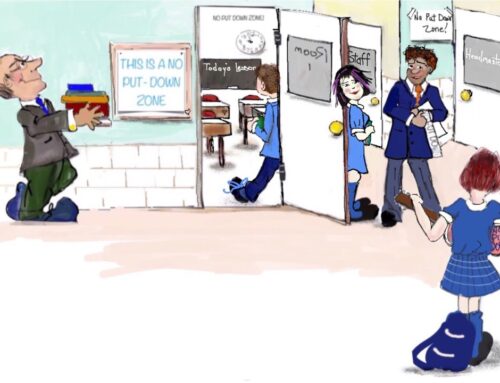Sue Roffey is speaking on pupil behaviour and teacher wellbeing at PedagooHampshire18 on 15th September.
Tickets at: eventbrite.co.uk/e/pedagoohampshire18-tickets-43049754976
At only £10 and many great talks, this has to be the best value professional development around!
Here is Sue’s blog post about this (you can also download a copy):
In charge or in control: The power of positive relationships for behaviour
A healthy relationship is where there is equality and shared decision making. A controlling relationship does not model positive relationship skills and undermines protective factors in resilience. It can lead to resentment, is exhausting and reduces rather than increases the chance of pro-social behaviour. Where pupils are already emotionally volatile it can spark a melt-down. At the far end of controlling relationships, we find bullying and abuse.
Relationships between teachers and students are already unequal because a teacher has more power than a student. Using this authority to empower others is a more intelligent way to promote positive behaviour than asserting power over others.
A common discourse on teacher-student relationships is that a ‘good’ teacher has to be in control of their students. The evidence shows otherwise. A good teacher certainly does not let students run riot but does give them a say in what happens. A teacher who is able to be in charge of proceedings in the classroom, orchestrate events, lead, support, guide, encourage participation, provide timely feedback and be responsive to individuals as well as the group does not need to control students. An effective educator encourages self-control and believes in the ability of students to learn this. It puts responsibility back where it belongs.
Relationships are enacted by what is said and not said and messages that are given about value and expectations. Words are powerful. We need to be aware not only of how we can use them to positive effect but also of the potential for damage.
Glasser (1998) says external control is destructive to relationships and that being disconnected is the source of almost all human problems. He advocates seven caring habits to counter what he calls ‘deadly habits’ which undermine healthy relationships:
| Caring Habit | Deadly Habit | Example of a practical application in school |
| Supporting | Criticising | ‘How can I help you?’ |
| Encouraging | Blaming | ‘Tomorrow is another day, let’s try again then.’ |
| Listening | Complaining | ‘What happened? What did you want to happen?’ |
| Accepting | Nagging | ‘That didn’t go well. How can we move on and make this better?’ |
| Trusting | Threatening | ‘I will come back later and see how you have got on.’ |
| Respecting | Punishing | ‘The decision is yours – but you need to know the consequences.’ |
| Negotiating difference | Bribing, rewarding to control | ‘Let’s see if we can both get what we want here?’ |
Teachers also bring their own constructs and emotions into any situation. The school system impacts on these. A teacher may feel supported as a member of an emotionally literate culture or fearful of criticism within an authoritarian one. Colleagues can boost your confidence or undermine it; they can be supportive or dismissive of your approach; they can build on what you are trying to develop with students or ridicule this. If relationships between teachers are warm, supportive and full of good humour, this leads to higher levels of social capital and relational trust. It is easier to respond thoughtfully to challenging behaviour in such an ethos, and be more resilient when things do not go well.
Questions for Reflection and Discussion
What is your experience of the above approaches?
What helps build strong relationships across a school?
What supports vulnerable students whose behaviour is challenging AND the teachers who teach them?
This blog is taken from Chapter 7 of Changing Behaviour in Schools: Promoting Positive Relationships and Wellbeing published by Sage, 2012. The illustration is from The New Teachers Survival Guide to Behaviour (2011) also published by Sage © Nic Watts








Leave A Comment
You must be logged in to post a comment.